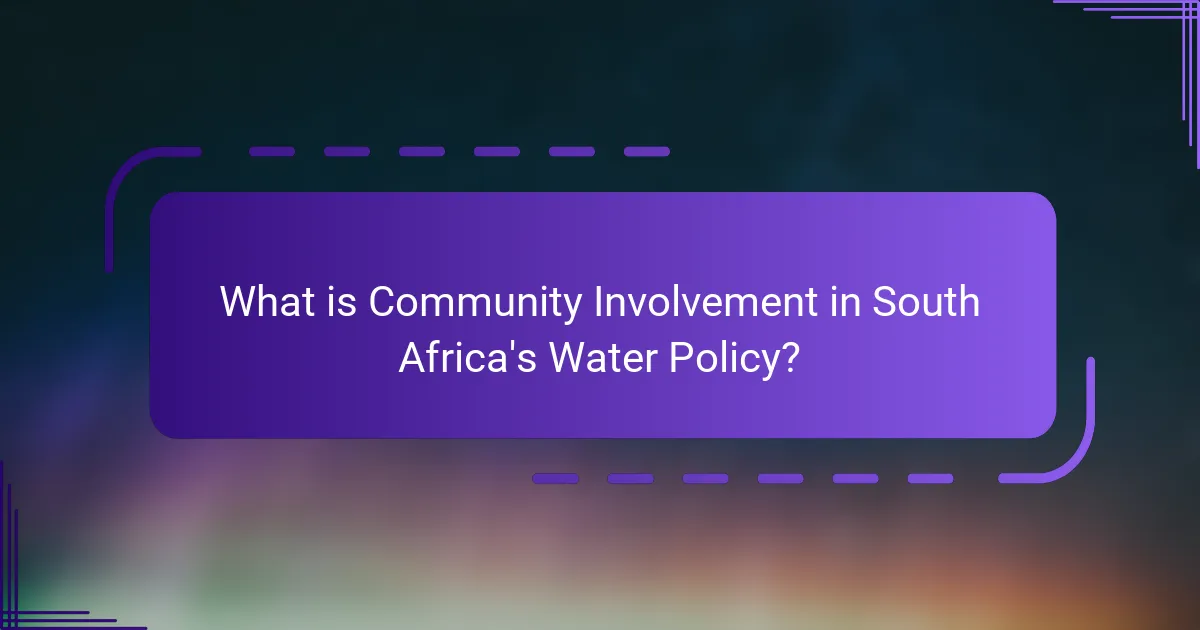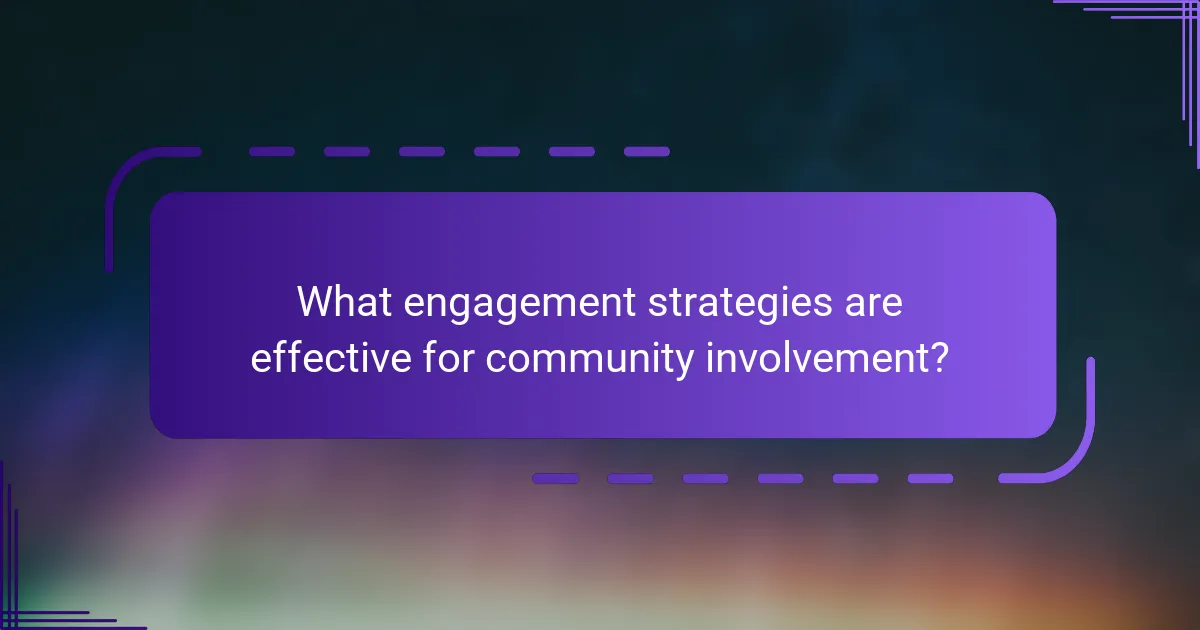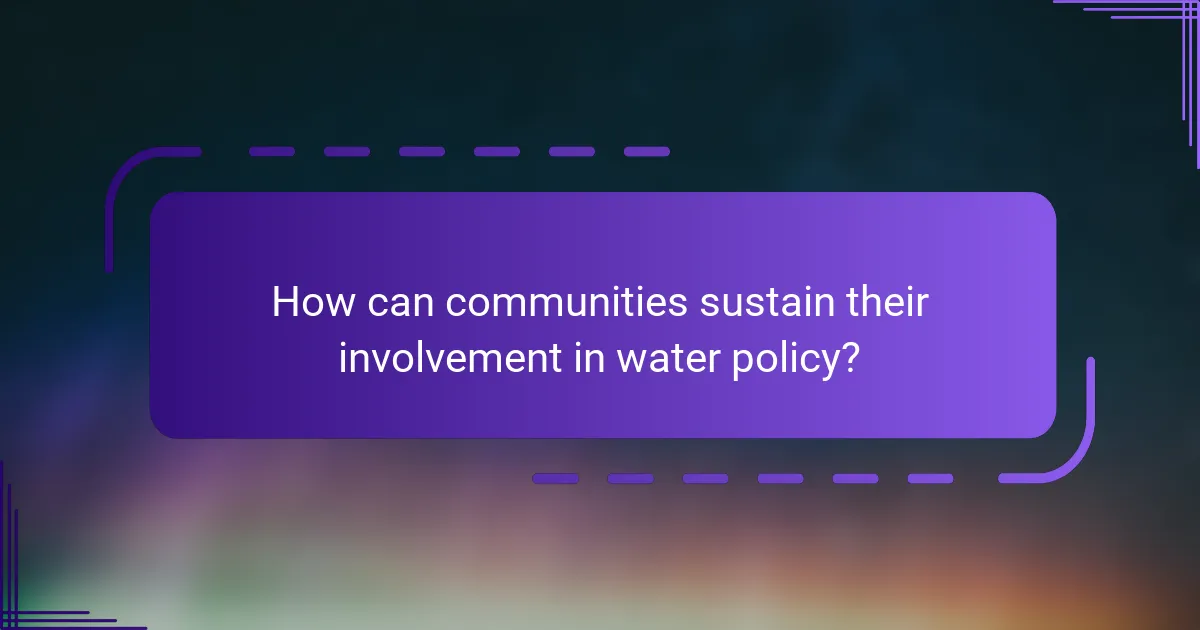Community involvement in South Africa’s water policy is the active participation of local communities in the decision-making processes related to water management. This engagement is essential for aligning water policies with the needs of affected populations and enhancing accountability. The South African government, through legislation like the National Water Act of 1998, emphasizes public participation, which has been shown to improve water management outcomes. Effective strategies for fostering community involvement include participatory planning, collaborative decision-making, and continuous education, which empower residents and promote sustainable practices. Establishing community advisory boards and conducting regular workshops further enhance transparency and trust, ultimately leading to better stewardship of water resources.

What is Community Involvement in South Africa’s Water Policy?
Community involvement in South Africa’s water policy refers to the active participation of local communities in decision-making processes regarding water management. This involvement is crucial for ensuring that water policies reflect the needs and priorities of those affected. The South African government recognizes that community engagement enhances accountability and promotes sustainable water use. Evidence shows that when communities are involved, water management outcomes improve. For instance, the National Water Act of 1998 emphasizes public participation in water resource management. This act mandates the inclusion of community voices in water-related decisions, fostering a sense of ownership and responsibility.
Why is community involvement important in water policy?
Community involvement is important in water policy because it ensures that local needs and perspectives are considered. Engaging communities fosters trust and transparency between policymakers and residents. This involvement leads to more effective and sustainable water management solutions. Studies show that inclusive decision-making improves resource allocation and enhances compliance with regulations. For example, the South African Water Act emphasizes community participation as vital for equitable access to water resources. Additionally, community insights can identify unique local challenges and opportunities, leading to tailored solutions. Overall, community involvement strengthens the governance of water resources and promotes social equity.
What are the key benefits of engaging communities in water policy?
Engaging communities in water policy leads to improved decision-making and resource management. Community involvement enhances transparency and accountability in policy processes. It fosters a sense of ownership among residents, encouraging sustainable practices. Research shows that local knowledge contributes valuable insights into water management challenges. Studies indicate that engaged communities are more likely to support and comply with water policies. This collaboration can also lead to innovative solutions tailored to local needs. Moreover, involving communities builds trust between policymakers and residents. Ultimately, these benefits result in more effective and equitable water management outcomes.
How does community involvement enhance water management practices?
Community involvement enhances water management practices by fostering local ownership and accountability. Engaged communities are more likely to participate in sustainable practices. They contribute valuable local knowledge about water resources. This knowledge helps tailor management strategies to specific regional needs. Active participation also leads to increased transparency in decision-making. Transparency builds trust between authorities and community members. Studies show that communities involved in water management report better resource conservation. For example, the South African Water Research Commission found that community-led initiatives improved water quality and reduced wastage.
What are the main challenges to community involvement in water policy?
The main challenges to community involvement in water policy include lack of awareness, limited resources, and insufficient representation. Many community members are unaware of their rights and the significance of their involvement in water policy decisions. This lack of awareness leads to low participation rates. Limited financial and human resources also hinder effective community engagement. Communities often lack the necessary funding and expertise to engage meaningfully. Additionally, insufficient representation in decision-making processes can result in policies that do not reflect community needs. This disconnect can further discourage community involvement.
What barriers do communities face in participating in water policy decisions?
Communities face several barriers in participating in water policy decisions. Limited access to information reduces their ability to engage effectively. Many community members lack awareness of existing water policies and their implications. Language barriers can hinder understanding of technical documents. Economic constraints may prevent participation in meetings or workshops. Additionally, marginalized groups often face systemic exclusion from decision-making processes. Cultural differences can also impact communication and engagement. These barriers collectively limit community influence on water policy outcomes.
How can these challenges be overcome to improve engagement?
To overcome challenges in community engagement for South Africa’s water policy, inclusive communication strategies must be implemented. These strategies should ensure that all community members have access to information and opportunities for input. Utilizing local languages can enhance understanding and participation. Additionally, regular feedback mechanisms should be established to address community concerns promptly. Evidence shows that projects with consistent follow-up improve trust and collaboration. For example, the Water Research Commission reported that communities engaged in two-way dialogues significantly increased their involvement in water management decisions.

What engagement strategies are effective for community involvement?
Effective engagement strategies for community involvement include participatory planning and collaborative decision-making. These strategies foster a sense of ownership among community members. Participatory planning allows residents to contribute their insights and preferences. Collaborative decision-making involves stakeholders working together to reach consensus. Research shows that these methods increase community trust and satisfaction. For example, the South African Water Research Commission emphasizes community participation in water management. Their studies indicate that engaged communities are more likely to support sustainable practices. Thus, implementing these strategies can enhance community involvement in water policy.
How can local governments foster community participation?
Local governments can foster community participation by implementing inclusive engagement strategies. These strategies include organizing public forums to discuss local issues. They can also create advisory boards that involve community members in decision-making. Providing accessible information about policies encourages informed participation. Utilizing social media platforms allows for broader outreach and feedback. Training local leaders in facilitation skills enhances community dialogue. Research shows that communities involved in decision-making see improved outcomes. For example, the South African Water Policy emphasizes stakeholder engagement as a key success factor.
What role do workshops and forums play in community engagement?
Workshops and forums serve as vital platforms for community engagement. They facilitate open dialogue among community members, policymakers, and stakeholders. These interactions promote understanding of local water issues in South Africa. Workshops provide hands-on learning experiences that empower participants. Forums allow for diverse perspectives to be shared and considered. Research indicates that inclusive discussions lead to better decision-making in water management. Engaging communities in workshops and forums fosters a sense of ownership over local water policies. This participatory approach strengthens community ties and enhances collaborative problem-solving.
How can technology be utilized to enhance community involvement?
Technology can enhance community involvement by facilitating communication and collaboration. Digital platforms enable residents to share their concerns and suggestions easily. Social media allows for real-time updates and engagement on water policy issues. Mobile applications can provide information on local water resources and events. Online surveys can gather community feedback efficiently. Geographic Information Systems (GIS) can visualize water data to inform residents. Virtual meetings can increase participation by removing geographical barriers. According to a study by the World Bank, digital tools significantly improve community engagement in policy-making processes.
What are successful examples of community engagement in water policy?
Successful examples of community engagement in water policy include the establishment of water user associations in South Africa. These associations empower local communities to manage water resources effectively. For instance, the Umgeni Water Board collaborates with communities to ensure sustainable water supply. Another example is the Community-Based Natural Resource Management program, which involves residents in decision-making processes. This program has shown significant improvements in local water management practices. Additionally, the Integrated Water Resource Management approach encourages stakeholder participation at all levels. These initiatives have led to enhanced accountability and resource sustainability in water policies.
Which case studies highlight effective community involvement in South Africa?
The case studies that highlight effective community involvement in South Africa include the Umgeni Water project and the Water Services Development Plans (WSDPs). The Umgeni Water project engaged local communities to improve water supply management. This initiative successfully integrated community feedback into planning processes. The WSDPs involved communities in decision-making regarding local water services. These plans aimed to ensure that community needs were prioritized in water resource management. Both case studies demonstrate the importance of community participation in enhancing water policy outcomes in South Africa.
What lessons can be learned from these successful initiatives?
Successful initiatives in community involvement for South Africa’s water policy demonstrate key lessons. First, active participation fosters trust between communities and authorities. Engagement strategies that include local voices lead to better decision-making. Transparency in processes enhances community buy-in and accountability. Collaboration with local organizations amplifies resources and expertise. Education on water issues empowers communities to advocate for their needs. Tailored communication strategies ensure inclusivity and understanding across diverse populations. Successful initiatives also highlight the importance of ongoing feedback mechanisms to adapt policies effectively. These lessons reinforce the value of community-driven approaches in sustainable water management.

How can communities sustain their involvement in water policy?
Communities can sustain their involvement in water policy through continuous education and engagement. Regular workshops and training sessions can inform residents about water issues. This knowledge empowers them to participate actively in policy discussions. Collaborating with local governments enhances transparency and trust. Establishing community advisory boards allows for ongoing dialogue. These boards serve as platforms for voicing concerns and suggestions. Engaging in local water management initiatives fosters a sense of ownership. This involvement can lead to better stewardship of water resources. Studies show that informed communities are more likely to advocate for sustainable practices.
What strategies can ensure ongoing community engagement?
Effective strategies for ongoing community engagement include regular communication, participatory decision-making, and feedback mechanisms. Regular communication keeps community members informed about developments and initiatives. Participatory decision-making involves including community members in the planning and implementation processes. This fosters a sense of ownership and responsibility. Feedback mechanisms allow community members to voice their opinions and concerns. This ensures their perspectives are considered in future actions. Research shows that communities engaged in decision-making processes are more likely to remain involved. The South African Water Policy emphasizes these strategies to enhance community participation in water management.
How can communities build capacity for sustained participation?
Communities can build capacity for sustained participation by fostering inclusive decision-making processes. This involves engaging all stakeholders in discussions about water policy. Training programs can enhance skills and knowledge related to water management. Access to resources and information is crucial for informed participation. Establishing partnerships with local organizations can strengthen community networks. Regular feedback mechanisms can ensure ongoing dialogue and adjustment of strategies. Research shows that communities with strong networks and training programs have higher participation rates in governance. For instance, the South African Water Research Commission emphasizes capacity building as a key factor for effective community engagement.
What role does education play in maintaining engagement?
Education plays a crucial role in maintaining engagement within community involvement in South Africa’s water policy. It equips community members with knowledge about water issues, fostering informed discussions. Education enhances understanding of policies, encouraging active participation. Informed citizens are more likely to engage in decision-making processes. Research shows that communities with higher education levels demonstrate greater involvement in local governance. For example, the South African National Water Act emphasizes the importance of public awareness and education in water resource management. This highlights the correlation between education and sustained community engagement in water policy initiatives.
What best practices can communities adopt for effective involvement?
Communities can adopt several best practices for effective involvement in water policy. First, they should establish clear communication channels. This ensures that information flows freely between stakeholders. Second, communities must engage in regular meetings to discuss water issues. These meetings foster collaboration and transparency among participants. Third, they should create inclusive platforms for diverse voices. Representation from various community segments enhances decision-making. Fourth, communities need to provide educational resources about water policy. Knowledge empowers individuals to participate meaningfully. Fifth, they should collaborate with local authorities and organizations. Partnerships can amplify their influence and access to resources. Lastly, communities must monitor and evaluate their involvement efforts. Assessing progress helps to refine strategies and improve outcomes. These practices have been shown to enhance community engagement in water management initiatives across South Africa.
How can communities effectively communicate their needs and concerns?
Communities can effectively communicate their needs and concerns through structured dialogue and active participation. Engaging in regular meetings allows for direct interaction between community members and decision-makers. Utilizing surveys and feedback forms can gather diverse opinions and insights. Establishing community forums fosters open discussion and transparency. Collaborating with local organizations can amplify voices and ensure representation. Social media platforms can be used to reach a wider audience quickly. Documenting issues and solutions promotes accountability and follow-up. Evidence from successful community engagement initiatives in South Africa shows that these methods lead to improved policy outcomes.
What methods can be used to evaluate the success of community involvement?
Methods to evaluate the success of community involvement include surveys, focus groups, and participatory assessments. Surveys measure community satisfaction and engagement levels quantitatively. Focus groups provide qualitative insights into community perceptions and experiences. Participatory assessments involve community members in evaluating their own involvement and its outcomes. These methods allow for comprehensive data collection. They help identify strengths and weaknesses in community engagement strategies. Successful community involvement is often reflected in increased participation rates and positive feedback. Additionally, tracking changes in community attitudes towards water policy can indicate success.
Community involvement in South Africa’s water policy is the active participation of local communities in decision-making processes regarding water management. This article outlines the importance of community engagement, highlighting its benefits such as improved decision-making, enhanced transparency, and increased sustainability in water management practices. It addresses the challenges communities face, including lack of awareness and limited resources, and discusses effective engagement strategies like participatory planning and the use of technology. Successful case studies demonstrate how community involvement leads to better water policy outcomes, emphasizing the need for ongoing education and collaboration to sustain participation.